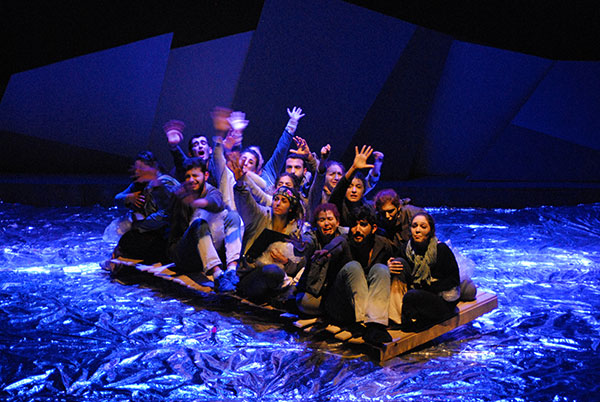The Lebanese American University made history this weekend by running the largest-ever international middle school Model UN program, held in New York City.
The three-day conference brought together more than 1,720 middle school students for the 17th Global Classrooms International Model United Nations conference.
The motto of the conference was “Live Diversity,” and with 26 countries and 28 U.S. states represented, LAU lived up to that motto.
In addition to Lebanon and the U.S., students came from Turkey, South Korea, Japan, China, Ghana and Honduras. They assumed the roles of UN member-states, blocks or bodies, and over the course of two days, debated in 13 committees, ranging from UNHCR to UNICEF and the Security Council, and tackled issues like child labor, global hunger, human trafficking, maternal health, malnutrition, the threat of extremist groups, and more. Throughout the conference, the young ‘delegates’ formed blocks, drafted resolutions and voted on them.
The conference ended with a dramatic closing ceremony in the United Nations General Assembly Hall, where students had the chance to sit in the very same seats as the leaders of the UN’s 193 member-states.
“There are those who dream, and that is important,” said LAU President Joseph G. Jabbra, addressing participants from the podium of the General Assembly Hall, “and there are those who do, and that is also important, but we need those who dream AND do, and we are counting on you.”
Students were also addressed by Ahmad Alhendawi, the United Nations Secretary-General's Envoy on Youth, and by former minister Bahia Hariri, who served in her capacity as UN Goodwill Ambassador for Arab Women and Girls.
Global Classrooms International Model UN is the flagship education program of the Lebanese American University. Operated since 1999 by the United Nations Association of the United States of America, the prestigious GCI brand in New York City is this year taken over by LAU.
LAU will lead another conference in New York City next month for high school students. The goal of the conferences is to equip students with the UN culture of global awareness by allowing them to step into the shoes of ambassadors.
![[Photo]](http://www.lau.edu.lb/news-events/images/gcimun-ny-middleschool-03-big.jpg)
Former minister and current MP Bahia Hariri addressed the student in her capacity as UN Goodwill Ambassador for Arab Women and Girls.
![[Photo]](http://www.lau.edu.lb/news-events/images/gcimun-ny-middleschool-02-big.jpg)
Participating students came from 26 countries.
![[Photo]](http://www.lau.edu.lb/news-events/images/gcimun-ny-middleschool-01-big.jpg)
LAU President Joseph G. Jabbra addressing participants.
![[Photo]](http://www.lau.edu.lb/news-events/images/cep-british-council-01-big.jpg)

![[Photo]](http://www.lau.edu.lb/news-events/images/the-limits-of-words-01-big.jpg)
![[Photo]](http://www.lau.edu.lb/news-events/images/sleep-of-the-gazelles-04-big.jpg)
![[Photo]](http://www.lau.edu.lb/news-events/images/sleep-of-the-gazelles-03-big.jpg)
![[Photo]](http://www.lau.edu.lb/news-events/images/sleep-of-the-gazelles-02-big.jpg)
![[Photo]](http://www.lau.edu.lb/news-events/images/sleep-of-the-gazelles-01-big.jpg)
![[Photo]](http://www.lau.edu.lb/news-events/images/nutrition-conference-2016-01-big.jpg)
![[Photo]](http://www.lau.edu.lb/news-events/images/comics-sumposium-2016-01-big.jpg)
![[Photo]](http://www.lau.edu.lb/news-events/images/dance-festival-2016-01-big.jpg)
![[Photo]](http://www.lau.edu.lb/news-events/images/dance-festival-2016-03-big.jpg)
![[Photo]](http://www.lau.edu.lb/news-events/images/aksob-aacsb-accreditation-01-big.jpg)
![[Photo]](http://www.lau.edu.lb/news-events/images/ipe-conference-03-big.jpg)
![[Photo]](http://www.lau.edu.lb/news-events/images/ipe-conference-02-big.jpg)
![[Photo]](http://www.lau.edu.lb/news-events/images/multimedia-storytelling-workshop-01-big.jpg)
![[Photo]](http://www.lau.edu.lb/news-events/images/ngo-symposium-2016-01-big.jpg)
![[Photo]](http://www.lau.edu.lb/news-events/images/online-extremism-forum-01-big.jpg)
![[Photo]](http://www.lau.edu.lb/news-events/images/wharton-sob-lina-beydoun-2016-02-big.jpg)
![[Photo]](http://www.lau.edu.lb/news-events/images/wharton-sob-lina-beydoun-2016-01-big.jpg)
![[Photo]](http://www.lau.edu.lb/news-events/images/international-education-week-01-big.jpg)
![[Photo]](http://www.lau.edu.lb/news-events/images/creative-writing-workshops-2016-01-big.jpg)
![[Photo]](http://www.lau.edu.lb/news-events/images/jazz-in-the-living-room-01-big.jpg)
![[Photo]](http://www.lau.edu.lb/news-events/images/jazz-in-the-living-room-02-big.jpg)